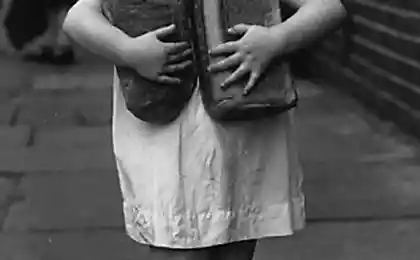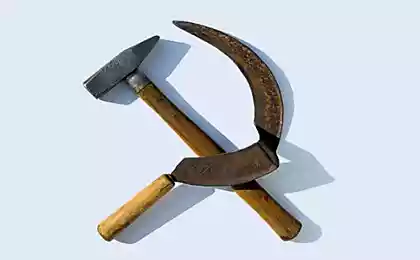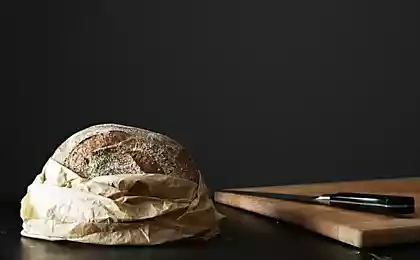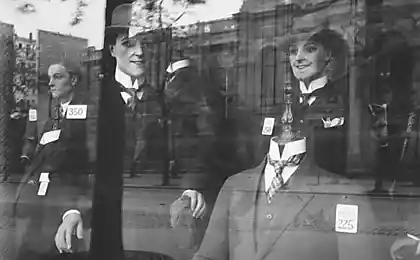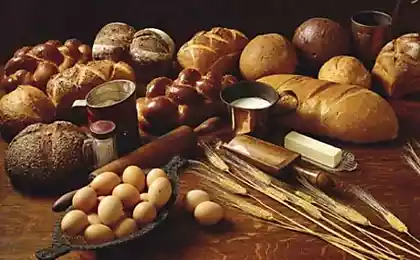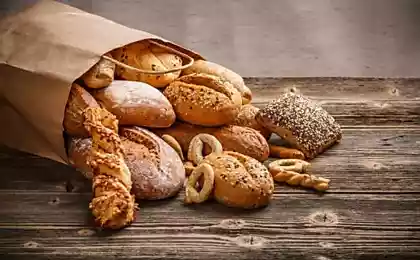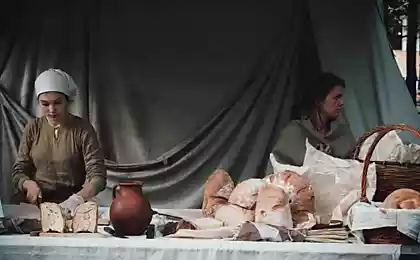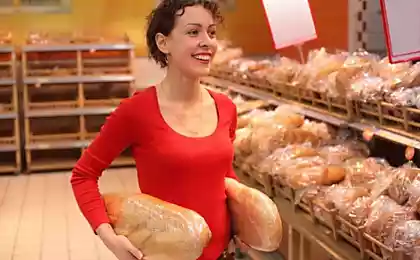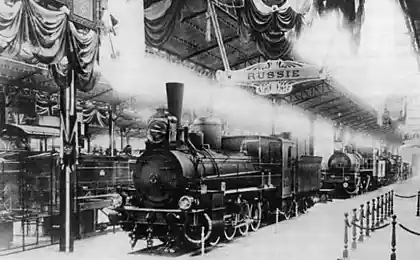405
Bread. The origins of the Revolution.
I remember reading a post-perestroika materials on how famously lived in Russia before the 1917 revolution, I wondered, and anyone wondering: & quot; But what they lacked? & Quot;
No way to blame "the Jews", "the Germans", "the Englishwoman shit" - all together. It turned out a little differently.
A little about the Russian Empire, which fed the whole of Europe. Leaven patriots and monarchists better not read.
Cannibalistic expression "short of food, but take out" belongs to the Minister of Finance of the government of Alexander III, Vyshnegradskii. This is called "hungry exports." Export continued even as a result of crop failures clean shower collection was about 14 pounds at the critical level of hunger in Russia - 19, 2 pounds. In 1891-92 over 30 million starving people. The Red Cross opened canteens to feed 1, 5 million people. According to official data greatly underestimated when killed 400 thousand people, the modern sources feel that killed more than half a million people, based on the account of poor foreigners mortality can be significantly longer.
One of the initiators of the monarchist organization "Russian National Union" Mikhail Osipovich Menshikov:
"Every year the army of Russian becoming increasingly ailing and physically incapable ... Of the three guys is difficult to choose one, it is of suitable for service ... Poor nutrition in the village, wandering life on earnings, early marriage requiring intensive labor in almost youthful age - these are the reasons physical exhaustion ... say terrible what life in prison to undergo sometimes a rookie. About 40 per cent. recruits almost the first time eating meat at enlistment. In the service of a soldier eats but good bread excellent meat soup and porridge, ie is what many do not already have the concept of the village ... »
Exactly the same data gave lead-Chief General V.Gurko - on an appeal from 1871 to 1901, reporting that 40% of peasant boys for the first time try the meat in the army.
"Alexander III irritated mention of" famine, "as a word, invented by those who have nothing to eat. He Majesty commanded to replace the word "hunger" with "crop failure". General Administration of Press immediately sent out strict circular ».
F.A.Brokgauz and I.A.Efron 1913:
"After the famine in 1891, covering a vast area of 29 provinces, the Lower Volga region is constantly suffering from hunger: during the XX century. Samara Province starved 8 times, Saratov 9. Over the past thirty years, the largest hunger strike relate to 1880 (Lower Volga region, part of the lakeside and Novorossiysk province) and 1885 (New Russia and part nonchernozem provinces of Kaluga to Pskov); then followed by famine in 1891 famine 1892 in central and south-eastern provinces of the hunger strike in 1897 and 98 years. approximately in the same area; in the XX century. Hunger 1901 in 17 provinces of the center, south and east, the hunger strike in 1905 (22 provinces, including four nonchernozem, Pskov, Novgorod, Vitebsk, Kostroma), which opens a whole series of hunger strikes: 1906, 1907, 1908 and 1911 . (mainly eastern, central province, the New Russia) »
Lev Tolstoy. The trip across dozens of villages of different districts in the late 19th century:
"In all these villages, although there is no mix with the bread, as it was in 1891, but the bread, though clean, do not give their hearts' content. Welding - wheat, cabbage, potato, even the majority, no. The food consists of herbal soup, whitened, if there is a cow, and nezabelennyh, if it does not - and only bread. In all these villages, the majority sold and laid all that can be sold and lay ».
Professor of Medicine Emile Dillon:
"The Russian peasant ... goes to bed at six or five o'clock in the winter because they can not spend money to buy kerosene for lamps. He has no meat, eggs, butter, milk, cabbage is often no, he lives mainly on black bread and potatoes. Lives? He is dying of hunger because of their insufficient number ».
Writer Vladimir Korolenko:
"Now (1906-7 year) to the starving localities fathers sell daughters live goods merchants. Russian Progress obvious hunger ».
Chemist A.N.Engelgardt:
"Anyone who knows the country, who knows the situation and the life of the peasants, that do not need statistical data and calculations to know what we are selling grain abroad not from an excess ... The man of the intelligent class of such doubt is understandable because I do not believe, as it is so people live without eating. And yet it is true. Not that not having eaten were malnourished and live from hand to mouth, they eat all sorts of rubbish. Wheat, nice clean rye we send abroad, to the Germans, who will not eat any rubbish ... Our peasant-farmer is not enough wheat bread on a pacifier child pozhuet woman rye crust that she eats, put in a rag - suck. "< br />
"Kids eat worse than calves in a host having a good cattle. Mortality of children far more than the mortality rate of calves, and if the owner having a good cattle, calf mortality was as high as mortality of children from a peasant, the host would be impossible ... If the mother ate better if our wheat, which eating German, she remained at home, and the children would grow better and there would be no such deaths are not all these rampant typhus, scarlet fever, diphtheria. Selling German our wheat, we sell our blood, that is peasant children »
With an exceptional combination of weather conditions and the highest yield to Tsarist Russia in 1913 Russian Empire exported 530 million pounds of grain that was 6, 3% of the consumption of the European countries.
Novoselskiy "Mortality and life expectancy in Russia." 1916:
"From 5 to 10 years, the Russian mortality rate is about 2 times higher than in Europe, and up to 5 years - up order ... Mortality of children older than one year are also several times higher than the European»
The average life expectancy in Russia in 1913 - 32, 9 years. While in England - 52, France - 50 years, Germany - 49 years
via
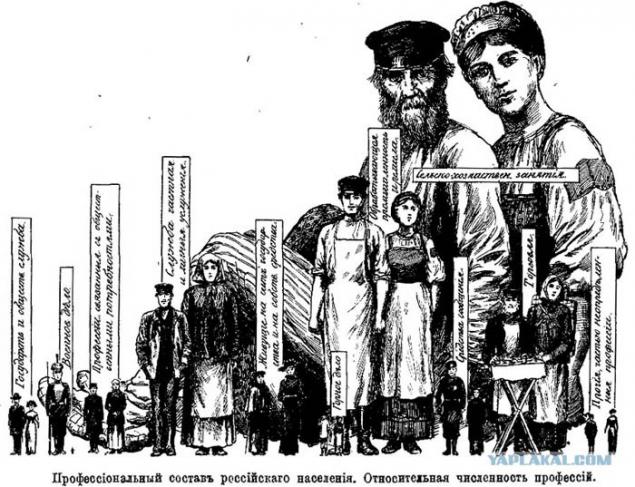
Source:
No way to blame "the Jews", "the Germans", "the Englishwoman shit" - all together. It turned out a little differently.
A little about the Russian Empire, which fed the whole of Europe. Leaven patriots and monarchists better not read.
Cannibalistic expression "short of food, but take out" belongs to the Minister of Finance of the government of Alexander III, Vyshnegradskii. This is called "hungry exports." Export continued even as a result of crop failures clean shower collection was about 14 pounds at the critical level of hunger in Russia - 19, 2 pounds. In 1891-92 over 30 million starving people. The Red Cross opened canteens to feed 1, 5 million people. According to official data greatly underestimated when killed 400 thousand people, the modern sources feel that killed more than half a million people, based on the account of poor foreigners mortality can be significantly longer.
One of the initiators of the monarchist organization "Russian National Union" Mikhail Osipovich Menshikov:
"Every year the army of Russian becoming increasingly ailing and physically incapable ... Of the three guys is difficult to choose one, it is of suitable for service ... Poor nutrition in the village, wandering life on earnings, early marriage requiring intensive labor in almost youthful age - these are the reasons physical exhaustion ... say terrible what life in prison to undergo sometimes a rookie. About 40 per cent. recruits almost the first time eating meat at enlistment. In the service of a soldier eats but good bread excellent meat soup and porridge, ie is what many do not already have the concept of the village ... »
Exactly the same data gave lead-Chief General V.Gurko - on an appeal from 1871 to 1901, reporting that 40% of peasant boys for the first time try the meat in the army.
"Alexander III irritated mention of" famine, "as a word, invented by those who have nothing to eat. He Majesty commanded to replace the word "hunger" with "crop failure". General Administration of Press immediately sent out strict circular ».
F.A.Brokgauz and I.A.Efron 1913:
"After the famine in 1891, covering a vast area of 29 provinces, the Lower Volga region is constantly suffering from hunger: during the XX century. Samara Province starved 8 times, Saratov 9. Over the past thirty years, the largest hunger strike relate to 1880 (Lower Volga region, part of the lakeside and Novorossiysk province) and 1885 (New Russia and part nonchernozem provinces of Kaluga to Pskov); then followed by famine in 1891 famine 1892 in central and south-eastern provinces of the hunger strike in 1897 and 98 years. approximately in the same area; in the XX century. Hunger 1901 in 17 provinces of the center, south and east, the hunger strike in 1905 (22 provinces, including four nonchernozem, Pskov, Novgorod, Vitebsk, Kostroma), which opens a whole series of hunger strikes: 1906, 1907, 1908 and 1911 . (mainly eastern, central province, the New Russia) »
Lev Tolstoy. The trip across dozens of villages of different districts in the late 19th century:
"In all these villages, although there is no mix with the bread, as it was in 1891, but the bread, though clean, do not give their hearts' content. Welding - wheat, cabbage, potato, even the majority, no. The food consists of herbal soup, whitened, if there is a cow, and nezabelennyh, if it does not - and only bread. In all these villages, the majority sold and laid all that can be sold and lay ».
Professor of Medicine Emile Dillon:
"The Russian peasant ... goes to bed at six or five o'clock in the winter because they can not spend money to buy kerosene for lamps. He has no meat, eggs, butter, milk, cabbage is often no, he lives mainly on black bread and potatoes. Lives? He is dying of hunger because of their insufficient number ».
Writer Vladimir Korolenko:
"Now (1906-7 year) to the starving localities fathers sell daughters live goods merchants. Russian Progress obvious hunger ».
Chemist A.N.Engelgardt:
"Anyone who knows the country, who knows the situation and the life of the peasants, that do not need statistical data and calculations to know what we are selling grain abroad not from an excess ... The man of the intelligent class of such doubt is understandable because I do not believe, as it is so people live without eating. And yet it is true. Not that not having eaten were malnourished and live from hand to mouth, they eat all sorts of rubbish. Wheat, nice clean rye we send abroad, to the Germans, who will not eat any rubbish ... Our peasant-farmer is not enough wheat bread on a pacifier child pozhuet woman rye crust that she eats, put in a rag - suck. "< br />
"Kids eat worse than calves in a host having a good cattle. Mortality of children far more than the mortality rate of calves, and if the owner having a good cattle, calf mortality was as high as mortality of children from a peasant, the host would be impossible ... If the mother ate better if our wheat, which eating German, she remained at home, and the children would grow better and there would be no such deaths are not all these rampant typhus, scarlet fever, diphtheria. Selling German our wheat, we sell our blood, that is peasant children »
With an exceptional combination of weather conditions and the highest yield to Tsarist Russia in 1913 Russian Empire exported 530 million pounds of grain that was 6, 3% of the consumption of the European countries.
Novoselskiy "Mortality and life expectancy in Russia." 1916:
"From 5 to 10 years, the Russian mortality rate is about 2 times higher than in Europe, and up to 5 years - up order ... Mortality of children older than one year are also several times higher than the European»
The average life expectancy in Russia in 1913 - 32, 9 years. While in England - 52, France - 50 years, Germany - 49 years
via

Source:
